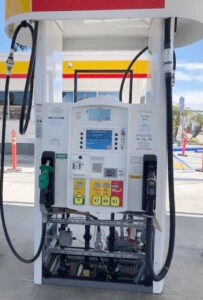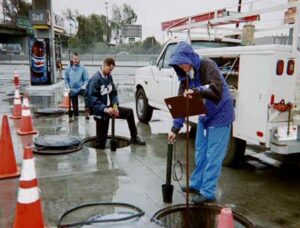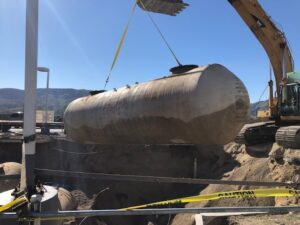Underground Storage Tank Program
UST Program Overview
The Ventura County Environmental Health Division regulates the installation, operation, repair, and closure of Underground Storage Tank (UST) systems within Ventura County, with the exception of the City of Oxnard and the City of Ventura.
The goal of the UST Program is to protect public health and safety, the environment, and groundwater from releases of petroleum and other hazardous substances. This is accomplished through plan check and inspection activities that ensure UST facilities are properly permitted and meet the release detection and monitoring requirements applicable to their type of equipment. Each UST system is inspected annually to determine compliance with all applicable laws, regulations, and local ordinances.
UST Laws and Regulations
- California Health and Safety Code, Chapter 6.7 – Amended and effective January 1, 2019
- California Code of Regulations, Title 23 – Effective October, 2020
- Ventura County Ordinance Code, Division 4, Chapter 5, Article 1.2
UST Testing Notifications and Results
To notify this Agency of an upcoming Monitoring System Certification, Spill Container Testing, Secondary Containment (SB989) Testing, Overfill Prevention Equipment Inspection, or other required test, submit your notification by email to ustnotifications@ventura.org at least 48 hours prior to the test.
Note: Any change in the test procedure utilized compared to previous testing must be submitted for evaluation prior to conducting the test.
Tests results must be submitted on the following State forms:
*Supporting documentation must be attached to State test and inspection report forms where applicable. For example, manufacturer tank charts and technician calculations shall be attached to Overfill Prevention Equipment Inspection reports, and test printouts shall be attached to Secondary Containment (SB989) Test reports.
Test results are due within 30 days from the date testing was performed and may be submitted directly by email to your assigned UST inspector. Click HERE if you are unsure who your assigned UST inspector is.
UST Guidance Documents
- Designated Underground Storage Tank Operator Requirements (SWRB 9/2020)
- Monitoring System Certification Form Instructions (SWRB 9/2020)
- Overfill Prevention Equipment Inspection Requirements (SWRB 10/2018)
- Spill Container Testing Requirements (SWRB 10/2018)
- Secondary Containment Testing Requirements (SWRB 10/2018)
Applying for or Renewing UST Operating Permits
The Ventura County Environmental Health Division requires that businesses operating USTs apply annually for a UST operating permit. Submittal into the California Environmental Reporting System (CERS) satisfies the requirement to submit a UST permit application. To obtain or renew your UST operating permit, a complete submittal, including all permit-required UST compliance documents, must be submitted at least once per calendar year into CERS in addition to remitting the required permit fees.
To access the CERS Business Portal, visit https://cers.calepa.ca.gov.
CERS Required UST Forms
*Click HERE for more information on acceptable mechanisms to demonstrate Financial Responsibility.
Other Required UST Forms
UST Installation, Removal, Modification, and Repair (Plan Check)
Refer to the UST Plan Check Guidelines to determine whether your proposed scope of work requires plan check and an approved permit prior to starting.
The Ventura County Environmental Health Division utilizes an electronic plan check process. Submit your completed plan check permit application, scope of work, PDF scaled plot plan (Max. Size: 11×17 inches), and supporting documentation to ustplancheck@ventura.org.
To determine what supporting documentation is required, refer to the instructions within each of the following plan check permit applications.
*For best use, download and save the application form before completing.
UST Plan Check Fees and Payment
The UST installation plan check permit fee covers ten (10) hours of project time, while the UST modification/repair and closure plan check permit fees cover five (5) hours of project time. Project time includes plan review, inspections, test and analytical results review, report writing, and any additional activities required to approve and complete the permit. Additional time required is billed at the current contract hourly rate.
Current UST plan check permit fees can be found HERE. At this time, we cannot accept online payment. Plan check permit fees can be mailed or hand-delivered to:
Ventura County Environmental Health Division
800 S. Victoria Ave.
Ventura, CA 93009-1730
*To avoid delays, please include a copy of the permit application with payment.
Closure of Single-Walled USTs (SB445)
On September 25, 2014, the Governor signed Senate Bill (SB) 445, requiring the removal of all single-walled USTs in California with a deadline of December 31, 2025. Loans and grants are available through the RUST program to assist eligible small businesses in removing single-walled USTs and replace them with double-walled USTs which meet current standards.
Click HERE to access the State Water Resources Control Board (SWRCB) single-walled UST closure website.
Information on eligibility requirements for RUST grants and loans can be found at: http://www.waterboards.ca.gov/water_issues/programs/ustcf/rust.shtml.
Information on eligibility requirements for reimbursement for corrective action by the UST Cleanup Fund can be found at: http://www.waterboards.ca.gov/water_issues/programs/ustcf.
The deadline for submittal of a claim application to the UST Cleanup Fund for reimbursement of eligible costs for corrective action is December 31, 2024. The UST Cleanup Fund sunsets on January 1, 2026. Do not delay!
Reporting Unauthorized Releases
Unauthorized Release: When is Reporting Required?
An unauthorized release that escapes from the secondary containment or from the primary containment, if no secondary containment exists, increases the hazard of fire or explosion, or causes deterioration of the secondary containment of the underground tank system shall be reported by the owner or operator to the local agency within 24 hours.
Unauthorized Release: When is Only Recording Sufficient?
Any unauthorized release from the primary containment (into the secondary containment), which the operator is able to clean up within eight hours after the release was detected or should reasonably have been detected, and which does not escape from the secondary containment, does not increase the hazard of fire or explosion, and does not cause any deterioration of the secondary containment of the underground storage tank, shall be recorded on the operator’s monitoring reports.
Submit your unauthorized release notification within 24 hours to ustnotifications@ventura.org.
UST Archived Records and Search Requests
The Ventura County Environmental Health Division maintains its most commonly requested files in electronic format on the internet as a service to the public. Electronic files may be viewed, downloaded, or printed from the website free of charge. While this Division strives to maintain accurate electronic copies of records, it has not verified that every electronic file is complete.
Click HERE to access the online records search feature, then select the category of UST records based on record year and current active/inactive tank status.
For Leaking Underground Fuel Tank (LUFT) records, click HERE to access the California Geotracker Database.
For those records not available online, click HERE and follow the instructions for submitting a Records Search Request form.
Ventura County CUPA Contacts
To locate contact information for your assigned UST inspector, click HERE and use the interactive district map.
Luis Romero
Supervisor
LuisJ.Romero@ventura.org
(805) 654-2823
Diane Wahl
Technical Lead
Diane.Wahl@ventura.org
(805) 662-6553
Other Regulatory Contacts
Oxnard CUPA
cupa@oxnard.org
(805) 385-7722
City of Ventura PA
Brett Reed
breed@cityofventura.ca.gov
(805) 320-8337






